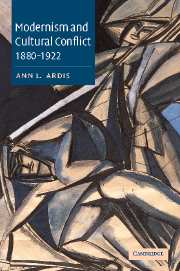Book contents
- Frontmatter
- Contents
- Acknowledgments
- Introduction: rethinking modernism, remapping the turn of the twentieth century
- 1 Beatrice Webb and the “serious” artist
- 2 Inventing literary tradition, ghosting Oscar Wilde and the Victorian fin de siècle
- 3 The Lost Girl, Tarr, and the “moment” of modernism
- 4 Mapping the middlebrow in Edwardian England
- 5 “Life is not composed of watertight compartments”: the New Age's critique of modernist literary specialization
- Conclusion: modernism and English studies in history
- Select bibliography
- Index
1 - Beatrice Webb and the “serious” artist
Published online by Cambridge University Press: 22 September 2009
- Frontmatter
- Contents
- Acknowledgments
- Introduction: rethinking modernism, remapping the turn of the twentieth century
- 1 Beatrice Webb and the “serious” artist
- 2 Inventing literary tradition, ghosting Oscar Wilde and the Victorian fin de siècle
- 3 The Lost Girl, Tarr, and the “moment” of modernism
- 4 Mapping the middlebrow in Edwardian England
- 5 “Life is not composed of watertight compartments”: the New Age's critique of modernist literary specialization
- Conclusion: modernism and English studies in history
- Select bibliography
- Index
Summary
It is curious that one should be asked to rewrite Sidney's Defense of Poesy in the year of grace 1913. During the intervening centuries, and before them, other centres of civilization had decided that good art was a blessing and that bad art was criminal, and they had spent some time and thought in trying to find means whereby to distinguish the true art from the sham. But in England now, in the age of Gosse as in the age of Gosson we are asked if the arts are moral. We are asked to define the relation of the arts to economics, we are asked what position the arts are to hold in the ideal republic. And it is obviously the opinion of many people less objectionable than the Sydney [sic] Webbs that the arts had better not exist at all.
Ezra Pound, “The Serious Artist” (1913)We've been sitting in the Park and listening to the Band and having a terrific argument about Shaw. Leonard says we owe a great deal to Shaw. I say that he only influenced the outer fringe of morality. Leonard says that the shop girls wouldn't be listening to the Band with their young men if it weren't for Shaw. I say the human heart is touched only by the poets. Leonard says rot, I say damn. Then we go home. Leonard says I'm narrow. I say he's stunted. But don't you agree with me that the Edwardians, from 1895 to 1914, made a pretty poor show. […]
- Type
- Chapter
- Information
- Modernism and Cultural Conflict, 1880–1922 , pp. 15 - 44Publisher: Cambridge University PressPrint publication year: 2002



